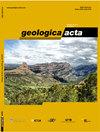Petrology and geochemistry of Plio-Quaternary high-Nb basalts from Shahr-e-Babak area:Insights into post-collision magmatic processes in the Kerman Cenozoic Magmatic Arc
IF 2
4区 地球科学
Q2 GEOLOGY
引用次数: 0
Abstract
Post-collision Pliocene-Quaternary basaltic rocks outcrop in the Kerman Cenozoic Magmatic Arc (KCMA) to the northwest and east of Shahr-e-Babak city. These porphyritic and vesicular basaltic rocks are composed essentially of clinopyroxene, olivine, and plagioclase. These basalts display alkaline affinity and negative Ta, Zr, Rb anomaly, but slightly negative Nb anomaly, relative to elements with similar compatibility, and positive Ba, K, Sr anomaly, suggesting their magma source related to subduction-accretion with implication of subducted slab derived components to the source. In the primitive mantle and chondrite normalized diagrams, these rocks show trace elements (except depletion in Nb, Ta) and Rare Earth Element (REE) patterns similar to the Ocean Island Basalts (OIB) and share trace and major element characteristics similar to High-Nb Basalts (HNBs). Geochemical analyses for major and trace elements suggest that the Shahr-e-Babak HNBs have undergone insignificant crustal contamination and minor olivine + Fe-Ti oxide ±clinopyroxene fractional crystallization. These HNBs derived from a partial melting (~5%) of garnet-peridotite mantle wedge, which have already metasomatized by overlying sediments, fluids, and adakitic (slab-derived) melts as major metasomatic agents in post-collision setting in the KCMA. We conclude that asthenospheric upwelling arising from slab break-off followed by the roll-back of subducting Neotethys slab also triggered metasomatized peridotite mantle wedge and caused its partial melting in the subduction zone.Shahr-e-Babak地区上第四纪高铌玄武岩的岩石学和地球化学:对Kerman新生代岩浆弧碰撞后岩浆过程的认识
碰撞后的上新世-第四纪玄武岩在Shahr-e-Babak市西北和东部的克尔曼新生代岩浆弧(KCMA)中露头。这些斑状和泡状玄武岩主要由斜辉石、橄榄石和斜长石组成。这些玄武岩显示出碱性亲和性和负Ta、Zr、Rb异常,但相对于具有相似相容性的元素,显示出轻微的负Nb异常,以及正Ba、K、Sr异常,表明其岩浆源与俯冲吸积有关,并暗示俯冲板衍生成分与岩浆源有关。在原始地幔和球粒陨石归一化图中,这些岩石显示出类似于海岛玄武岩(OIB)的微量元素(Nb、Ta贫化除外)和稀土元素(REE)模式,并具有类似于高Nb玄武岩(HNBs)的微量和主元素特征。主要元素和微量元素的地球化学分析表明,Shahr-e-Babak HNBs经历了轻微的地壳污染和少量的橄榄石+Fe-Ti氧化物±单斜辉石分级结晶。这些HNBs来源于石榴石-橄榄岩-地幔楔的部分熔融(~5%),在KCMA碰撞后环境中,石榴石-橄榄石-地幔楔已经被上覆沉积物、流体和adakitic(板状)熔体交代为主要交代剂。我们的结论是,板块断裂引起的软流圈上升流伴随着俯冲的新特提斯板块的回滚,也触发了交代橄榄岩地幔楔,并导致其在俯冲带部分熔融。
本文章由计算机程序翻译,如有差异,请以英文原文为准。
求助全文
约1分钟内获得全文
求助全文
来源期刊

Geologica Acta
地学-地质学
CiteScore
2.50
自引率
6.70%
发文量
13
审稿时长
>12 weeks
期刊介绍:
- Relevant conceptual developments in any area of the Earth Sciences.
- Studies presenting regional synthesis.
- Thematic issues or monographic volumes presenting the results from one or more research groups.
- Short papers reflecting interesting results or works in progress.
- Contributions and results from Research Projects, Workshops, Symposiums, Congresses and any relevant scientific activity related to Earth Sciences.
- Geologica Acta aims to stimulate rapid diffusion of results and efficient exchange of ideas between the widespread communities of Earth Science researchers (with special emphasis on Latinamerica, the Caribbean, Europe, the Mediterranean
 求助内容:
求助内容: 应助结果提醒方式:
应助结果提醒方式:


